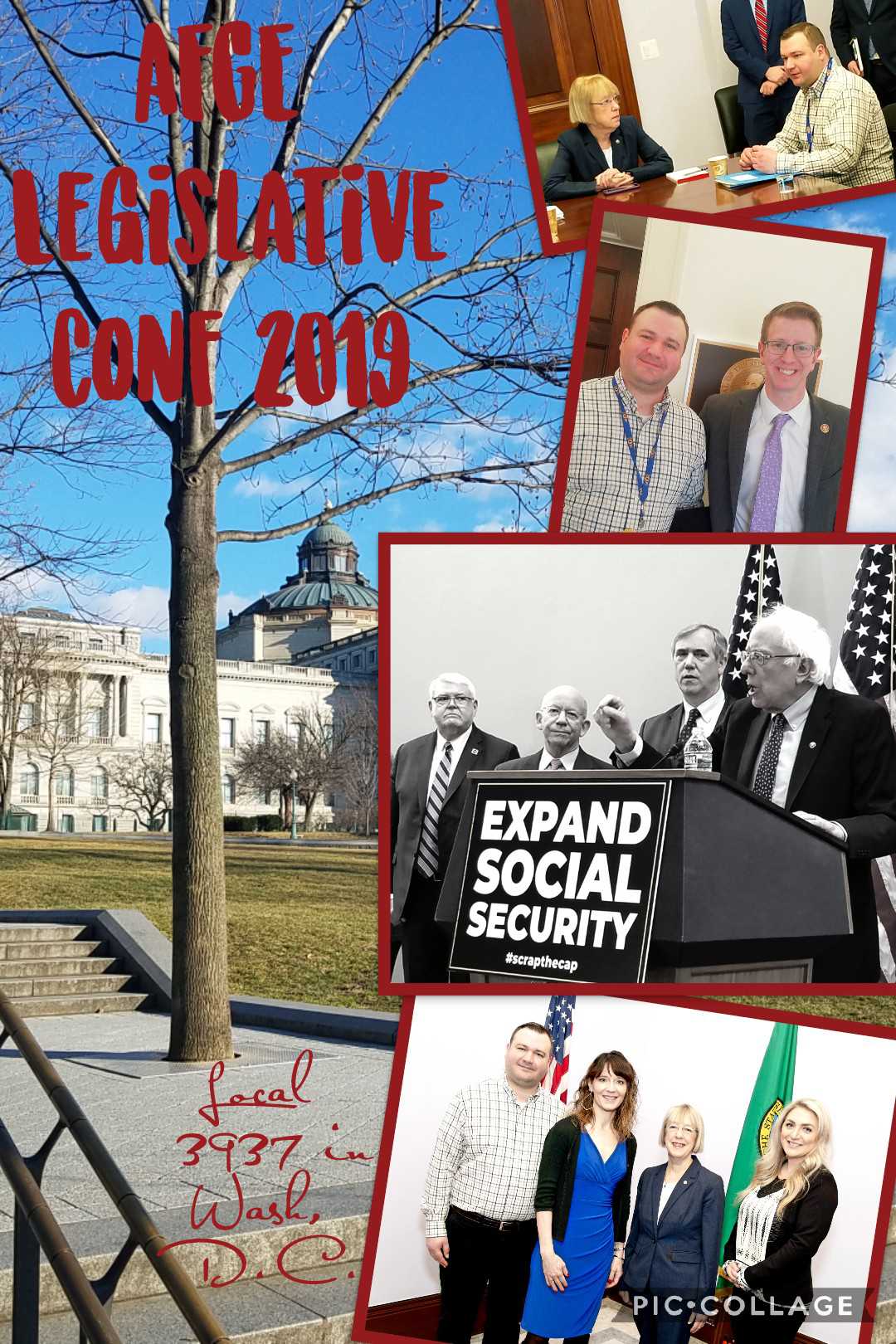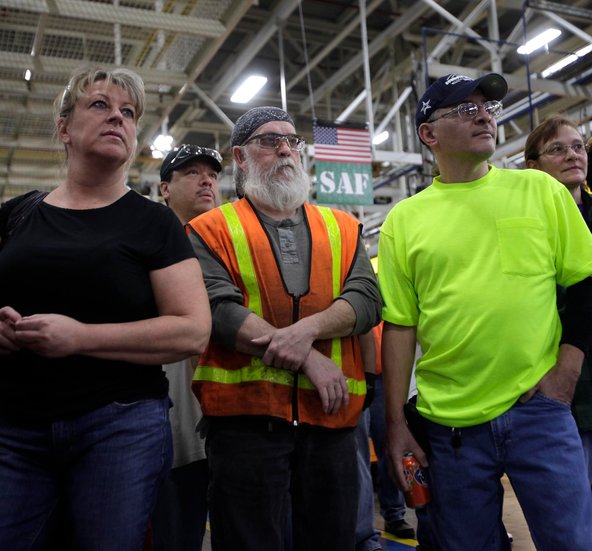-
Local Business Meeting
To All Members:
AFGE Local 3937's website will notify members of the time and place of the next scheduled Local Business Meeting. Local Business Meetings are being held via Zoom video call, to expand access throughout our regionwide Local. Please log in as a member to obtain the meeting access information under the Member Resources tab at left, Member Home page on the dropdown menu. JOIN US for important updates regarding your Union and your workplace.
Not yet a member? Click to get started here (details at left): https://join.afge.org/
When: Wednesday, May 8th, 5:30 - 6:30 PST
Call Info: (on Member Home page - log in; or apply to log in after we confirm membership)
When meetings are held at a secure office location (such as the ATSC), remember that it is a secure building, so have your PIV card and check in with the guard at the front entrance, then come on through to our conference room.
What: All AFGE members are encouraged to attend and participate in our meetings, and to bring any topics to the floor for discussion with your Local officers.
We will inform members when we plan to resume in-person or hybrid meetings.
 Paused
Paused
 Paused
Paused
A Message from C220 President, Jessica LaPointe (June, 2023) 
According to the Partnership for Public Service, the Social Security Administration (SSA) is now ranked dead last - 17th out of 17 – among large federal agencies based on the FY 2022 Federal Employee Viewpoint Survey (FEVS) results. Evidenced by the FEVs, employee morale at SSA has steadily declined since 2011, when it was ranked 2nd. Further, the President’s SSA FY 2024 budget request admits that staffing at SSA has reached a 25-year low as of the end of FY 2022. In data provided to the Union by SSA, employee attrition rates in FY 2022 were 10% overall, 16% in the teleservice centers and now 17% amongst new hires. The AFGE General Committee flash member survey conducted in March 2023 revealed that 53% of respondents are making plans to leave the Agency in the next year. An astonishing nearly 80% said their level of pay does not reflect the importance, complexity, and volume of work they do.
Why are employees leaving SSA in record numbers?
Employees are suffering mental and emotional burnout, according to AFGE C220 member survey conducted in September 2022:
- 76 % of members surveyed stated that their overwhelmingly large workloads prevent them from performing their jobs to the best of their ability.
- 9 out of 10 say they know someone that has left their job due to overwhelming work stress.
- 8.5 out of 10 say they know a co-worker that has sought therapy or medication to deal with work stressors.
- Tragically, 8% say they know a coworker that has committed suicide linked to work-related stress.
AFGE frequently informs Congress that federal pay is not competitive, lagging by almost 24% compared to similar jobs in the private sector. SSA employees lack many benefits enjoyed by those working in other agencies and in the private sector such as a telework program guaranteed by contract, remote work options, childcare subsidies, and student loan reimbursement. Employees feel bullied and micromanaged by their supervisors. They are assigned impossible workloads. Public demand for service has escalated since 2010. Delays in processing claims and post entitlement actions plus a general attitude change post pandemic has made serving a disenchanted public challenging. Beneficiaries have increased by 25% since 2010 as baby boomers retired and/or became disabled. During the same period of time, SSA staffing levels were reduced by 17%. SSA hired 50% less than in prior years and promoted 25% less employees. Assigning more work to fewer employees is not a formula for success. Employees spend most of their time doing claims intake and are scheduled for mini[1]mal "free time" to adjudicate claims and process other non-claims work.
Rather than empathize with a stressed out workforce, some managers resorted to abusive tactics like leveraging leave and surveillance of employee bathroom use - a common TSC management tactic. Some managers decided that disciplining employees, threatening performance based actions against employees, or withholding career advancement are successful ploys to squeeze more work out of SSA workers. These managers treat employees like disposable cogs in a machine. When employees burn out due to the stressful working conditions, the Agency just seeks to replace them rather than analyze the reasons employees leave the Agency and attempt to ameliorate the adverse conditions that drove them out the door.
Poor employee retention is causing public service to deteriorate.
- It now takes over 7 months to issue a decision on an initial disability claim. This is 3 months longer than the 120-day pre pandemic disability claim processing time.
- Sadly, in 11 years 100 thousand people have died while awaiting their disability decision.
- Almost 1/2 the call center calls are going unanswered due to a busy signal or because the caller becomes frustrated and hangs up while waiting.
- There are 4.2 million backlogged items pending at the Payment Centers.
While AFGE continues to sound the alarm with the agency, Congress, and the media, we continue to see an agency in denial, refusing to partner with the union to solve this historic employee morale and attrition crisis. SSA is in a state of disrepair, and the Agency leadership continues to refuse to listen to the employees and their exclusive representative - AFGE.
To get this Agency moving in the right direction AFGE Council 220 is working with the AFGE General Committee and AFGE National office to host an AFGE SSA Summer Legislative Conference June 19-23 and AFGE SSA National Day and Rally June 21, 2023.
AFGE will be asking that Congress and the Biden Administration to fully fund SSAs operational budget to the tune of $17.38 billion in FY24 in order to:
- Restore adequate staffing and public service back to 2010 levels.
- Make improvements to field office safety.
- Update technology to meet modern demands.
- Improve training.
- Give employees needed recruitment and retention pay and benefit incentives such as: childcare subsidies, student loan reimbursement, retention pay, and position General Service (GS) schedule upgrades.
- Support AFGE’s demand for an 8.7% pay increase for federal workers.
- Repeal the February 17, 2001 Executive Order 13203—Revocation of Executive Order and Presidential Memorandum Concerning Labor Management Partnerships.
- Enact new leadership. SSA needs a dynamic commissioner who believes in the importance of Social Security, Supplemental Security Income and Medicare as fundamental social programs that are critically necessary in a humane society. This new leader must be innovative and be willing and able to hire a management staff that understands that SSA will not thrive and succeed unless the Agency taps into worker knowledge and experience. A new commissioner must be committed to engagement with labor as partners in the mutual goal of providing service to claimants and beneficiaries and exemplary working conditions for SSA employees. This Commissioner must also fight for the resources that are necessary for SSA to resume being a model Agency in the government.
SSA’s 17th out of 17 ranking, dubbing it the worst place to work among large federal agencies, is simply unacceptable and it is going to take every leader in this nation in a position to reverse this course to do their part in achieving this goal.
Congress must do its job to fully fund SSA’s operating needs, so that we can be reborn from this crisis. President Biden, who claims to be the most labor friendly president in US history, must step in and appoint a new Commissioner at SSA and create a pathway to labor management partnership so we can begin to make fundamental changes from within to improve employee morale, retention, and customer service. We are now left with no other option, or we will continue to tragically watch the nation’s greatest anti-poverty program further deteriorate and leave the American people without their social safety net to rely on.

AFGE 2019 Legislative Conference 
AFGE Local3937 representatives returned home from the 2019 AFGE Legislative Conference in February with some good news!
Congress passed and the President signed a spending bill for the rest of the government. This bill provides a 1.9% raise for employees retroactive to the start of calendar year 2019, which we should see reflected in our paychecks soon.
Congress took note of management’s hostile actions during contract bargaining and the House Appropriations Committee is awaiting an answer from SSA Acting Commissioner Nancy Berryhill.

Our Second Vice-President John Pfannenstein, Secretary Laura Novakoski, local representative and Executive Board intern Nicole Carrier-Theulen, and retired delegate Monica Rodgers participated in preparatory meetings and training with other Council 220 members, then spread out at the Capitol to represent the interests of our employees and educate legislators about Social Security concerns and the kind of service we want to provide to the public. We met with as many of our congressional representatives, senators or their staff as possible, and distributed information packets, at almost 30 offices. Since our Local represents the entirety of Region 10 with 4 states (Alaska, Idaho, Washington and Oregon), that’s a lot of walking and talking!
 Following is a summary of the issues we discussed during our meetings:
Following is a summary of the issues we discussed during our meetings:Budget and Staffing
- From 2010 to 2018, our field offices have lost 12% of their staff, a net loss of almost 1700 employees. Lobby wait times have doubled during the same period due to the staffing shortage. The public is adversely impacted by our inability to respond to their needs in a timely manner. Some issues require more than one visit, and those who need to take time off work or who find it difficult to wait an hour or more in our offices for assistance (due to caring for or waiting with children, to age or infirmity) are especially affected. We appreciated the allocation of funding for field services for our 2019 budget, but too much of it was routed towards IT infrastructure, and too little towards direct public service and staffing. The 2020 budget must include line-item allocations of staff funding for field offices, hearing offices and payment centers. SSA needs to focus on hiring more support staff and lower-graded positions, to free time for higher-graded representatives to process the more complex work timely and efficiently.
- Hearings offices nationwide currently experience high backlogs. Without sufficient support staff like case technicians, paralegals, and decision writers, claimants are waiting 500-600 days on average for their case to be heard by an administrative law judge. Many applicants, whose conditions have significantly worsened, die during this waiting period.
- In order to even begin to address these struggles, our agency needs to be fully funded. Additional monies should be set aside solely for front-line employee hiring and training, so that we may resume our mission to provide the services our public has already paid for throughout their working lives. We serve an additional 1 million beneficiaries each year, so the budget needs to grow as well.
- Fair pay and staff retention. Since 2011, federal pay has lagged far behind inflation, leaving the adjusted value of salaries lower and lower. Congress should recognize that federal employees, more than any other group of Americans, bore the brunt of budget austerity and deficit reduction strategies that followed the Great Recession and have suffered losses totaling $246 billion in compensation cuts as a result. As a part of the bill ending the latest government shutdown, civilian federal employees were given a 1.9% raise, which is better than zero but didn’t even achieve pay parity with military federal employees. For 2020, AFGE is asking that Congress support a 3.6% overall adjustment (H.R. 1073 / S. 426 – FAIR Act of 2020). It would not restore the losses of the 3-year pay freeze and subsequent miniscule 1-2% increases. However, years of stagnant and falling inflation-adjusted wages, added to the stresses of struggling to meet expanding workloads with less staff, has led many workers to leave the agency.
- Avoid austerity cuts to employee compensation. Tied into our solid reasons for increasing wages as stated above, we strongly oppose the proposed elimination of the Federal Employee Retirement (FERS) defined benefit and the FERS Supplemental, as well as any measure that raises healthcare premiums or converts FEHBP into a voucher.
Contract
- SSA has been in national contract bargaining with AFGE, and despite several months of legitimate progress on the selected articles, the agency suddenly decided they’re done with negotiation and mediation, and have requested the Federal Service Impasses Panel (FSIP) take over the process. This is a heavily stacked body, where 7 of the 9 members were appointed by a Republican and are very unlikely to side with Labor. It is an inherently unfair system, and we encourage members of Congress to follow Representative Rosa DeLauro’s example to strongly encourage Commissioner Berryhill to send her team back to the table.
- President Trump’s Executive Orders of May 2018 were invalidated by a federal judge in August, but their spirit lives on in SSA’s regressive, anti-employee contract proposals that would gut civil service protections. It is apparent that the Agency wants to achieve at the bargaining table what they could not by EOs, and if management gets their way it will be a blank check to discriminate and will significantly worsen morale and open the door even wider for even long-time, dedicated employees to choose a different career path or to elect retirement.
Fraud
- From 2012 through 2018, SSA received 67,526 allegations of MySSA account fraud, resulting in only 27 investigations, and 19 convictions. Victims of MySSA fraud can experience undue hardship if their payments are redirected into a different bank account, and may be especially susceptible to identity theft when their personally identifiable information is compromised. The Agency must do better to safeguard the integrity of the sensitive data housed in our online portals.
- Anomalous and Unauthenticated claims have increased. Although the Agency has not released the statistics, field offices and teleservice centers have been recently encountering a dramatic increase of “anomalous claims” and a new category of online filing problems called “unauthenticated claims.” We requested a congressional inquiry into both the troubling rise of online fraud, and the questionable procedures SSA has adopted to close out what may be valid claims without proper notification.
There is additional information on these and other important issues at AFGE’s SSA Field Operations Council 220 webpage and at AFGE’s national webpage.
IMPORTANT: This information should not be downloaded using government equipment, read during duty time or sent to others using government equipment, if it suggests action to be taken in support of or against legislation. Do not use your government email address or government phone if you wish to contact your Member of Congress.


Local 3937 President Emeritus: Steve Kofahl
AFGE Local 3937 voted at our Local Business Meeting in March 2019 to name Steve Kofahl as lifetime President Emeritus for our Local. He served as Local President for many years, and even after his retirement, he has continued to be very available to the membership to our officers with his experience and his mentoring energy. He has moved on to help AFGE National as Retiree Coordinator and has remained active in Washington state and nationally with legislative issues that support Social Security, federal employees and retirees.

Cassandra Butler Wins 2018 Outstanding Service in Community Award 
We are as strong as the people in our community. That’s why every three years at our convention, our union recognizes a member who has done an outstanding job being an advocate for his or her local community. This year, the A. Philip Randolph-Hubert H. Humphrey Award is presented to Cassandra Butler, who exemplifies the volunteer spirit both in and outside work.

Besides balancing her assignment as a full-time Social Security Administration employee and her many union duties, everywhere she goes, Cassandra is always looking for ways to help those in need in her community. And those in need are often young, homeless people who do not have any type of support system to help them deal with difficult situations like drug addiction, pregnancies, mental illness, and domestic violence.
When Cassandra began working as a claims representative in the SSA Spokane field office in 2006, she worked for 10 years with pregnant and parenting homeless young women at Alexandria’s House through the Volunteers of America. On top of her full-time job, she spent 40 hours a week helping these young mothers learn the basic skills needed to be a good parent, get through school, and get employed.
When she moved to Seattle in August 2015 with a promotion to Quality Review Analyst at the Office of Quality Review, it didn’t take long for her to locate new volunteer opportunities. In January 2016, she began working with homeless young adults at a group-home style transitional community residence called Friends of Youth in Kirkland, Washington. Her volunteer work involved working one-on-one with these young people to prepare them to live on their own. To get to the residence, Cassandra had to commute more than two hours each way on top of a 30-40 hour per week schedule that included overnight shifts. Her level of commitment and caring is inspiring.
At the end of 2016, Cassandra made a change to another Friends of Youth facility called The Landing, an emergency shelter for young people in need. A year later, the Landing recognized her dedication and skills by offering her a paid position as program coordinator.
Cassandra found that helping people in her community actually helps make her a better federal employee. Both organizations she has been involved in are very connected to SSA as a lot of these young homeless people receive Supplemental Security Income because of their poverty and disability, including mental illness.
“It really kind of helps me to see the full scope of who we help and how early on SSA has an impact in young people’s lives and how important it is for the SSA system to stay right here and be available for these young people,” she said.
Asked what inspired her to help these young people, Cassandra said she herself became a mom at a young age and so she understands their struggles. Besides, her parents and brother in-law are social workers.
“I paid very close attention to the community that my children were growing up in and paid very close attention to what resources were available and what things were lacking for families and decided I was going to start to help to make that better. And moving to Seattle, the homeless crisis over here is even worse,” she explained.
Cassandra joined our union 12 years ago when she first started working at SSA after talking to a union rep who was really excited about the work of our union. She got more involved over the years and is currently serving as the executive vice president for Local 3937 and a regional vice president for Council 224.
Congratulations, Cassandra, for winning this well-deserved award! You are an inspiration to us all!
- AFGE.org

AFGE .org Latest Content 
Connection Failure: This usually happens when the news feed URL is entered incorrectly. 
DISCLAIMER: This is not a Government Hosted Website and portions of the website cannot be viewed on a Government Computer System, or during working hours, such as, but not limited to, the Political Links. AFGE does not promote illegal use of Government Computer Systems. Be aware of what you are viewing during work hours.
 |


.jpg)




